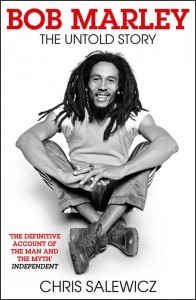Adventures in Bookland: Bob Marley by Chris Salewicz

Bob Marley by Chris Salewicz
This biography of Bob Marley is subtitled the untold story but, upon reading it, I discovered that the ‘untold’ bit appears to be an aspect of Marley’s life that Salewicz appears to have deliberately decided to suppress. Bob Marley was famous for his religion, as the most famous and visible proponent of Rastafarianism, and Salewicz covers that in some detail although little depth. However, Marley became very interested in the Ethiopian Orthodox Church. Now this is one of the two oldest Orthodox churches in the world (it contends with the Armenian Orthodox Church for the title of oldest) and it certainly dates to the fourth century and it possibly goes right back to apostolic times. The Ethiopian Orthodox Church famously claims to be the custodian of the Ark of the Covenant. Whatever the truth of this, the Church is a fiercely orthodox church that remained independent for centuries; being surrounded by Muslim kingdoms following the rise of Islam, it developed largely in isolation from European Christianity as an authentically Christian and African church. For Marley, searching for his spiritual homeland in Ethiopia, the discovery of the national church of that country as a church that remained defiant of Babylon throughout its history came as a major development. The problem, of course, was that for the Ethiopian Orthodox Church there was only one Son of God and His name was not Haile Selassie.
Then, late in 1980, Marley collapsed while jogging in Central Park. At the hospital he was told that cancer had spread throughout his body. The doctors gave him only weeks to live.
This is the part that Salewicz completely ignores in his book, as if embarrassed to admit it. Indeed, he shuffles Marley off this mortal coil in a matter of pages between finding out his diagnosis and his death. But it is clear, from other sources and my own research, that something extraordinary happened during those months. For in fact, Marley lived until until May the following year. On 4 November of 1980, Bob Marley, the prophet of Rastafarianism, was baptised into the Ethiopian Orthodox Church, taking the baptismal name Berhane Selassie, by Archbishop Abuna Yesehaq. Lest that be thought an aberration, Marley’s funeral, on 21 May 1981, was conducted by Archbishop Abuna Yesehaq. Marley, it is clear, died as a member of the Ethiopian Orthodox Church, not as a Rastafarian.
You would not know that from this book. I would imagine that Salewicz knows this perfectly well: his decision to exclude must therefore be a deliberate omission. With such an omission, one wonders what else he has chosen to omit. While the rest of the book seems to be sound enough, it must therefore have this question mark as to its veracity hanging over it – and as the point of a biography is to tell the truth about a person, that is a very large question mark indeed.
0 Comments